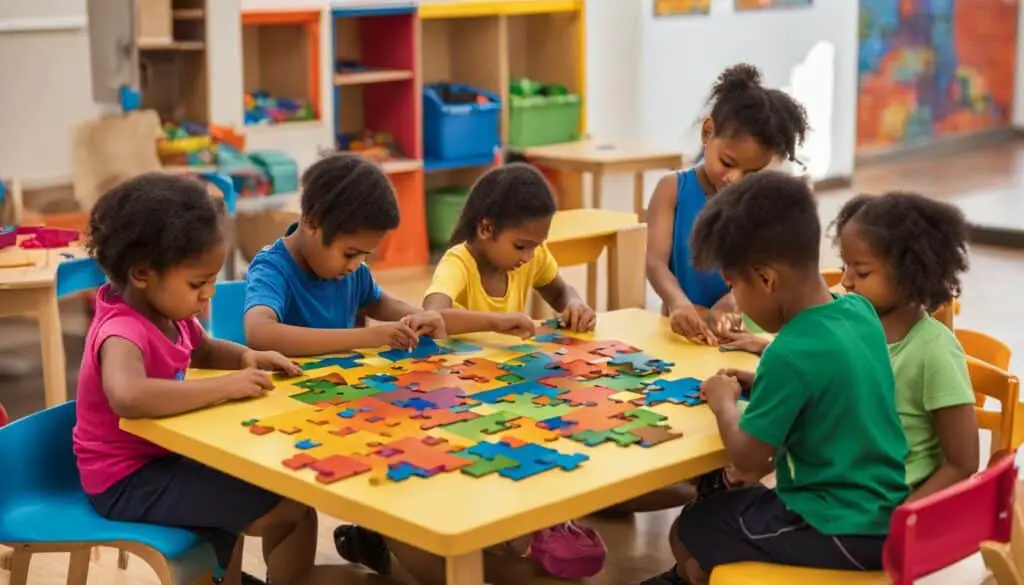
Boosting Children’s Self-Esteem: Effective Strategies
Welcome to my article on boosting children’s self-esteem. As a parent, guardian, or caregiver, you may be wondering what you can do to help your child feel more confident in themselves. The answer lies in adopting effective strategies that instill a sense of self-worth and resilience in children. In this article, I will explore the importance of boosting children’s self-esteem and provide practical strategies that you can implement to create a positive and supportive environment for your child.
Key Takeaways
- Creating a supportive and positive home environment is crucial in nurturing children’s self-esteem.
- Encouraging effort and recognizing a child’s achievements can significantly boost their self-confidence.
- Developing self-reflection and problem-solving skills empower children to tackle challenges and build resilience.
- Investing in our children’s self-esteem today will contribute to their well-being and success in the future.
Understanding the Importance of Self-Esteem
As a foundational aspect of a child’s emotional well-being, self-esteem has a significant impact on their interactions with others and overall development. When children have healthy levels of self-esteem, they are more likely to be confident, resilient, and willing to take risks.
The importance of self-esteem cannot be overstated. When children have low self-esteem, they may struggle to make friends, assert themselves in social situations, and perform well academically. These struggles can lead to a negative cycle, where the child’s confidence and sense of self-worth continue to decrease.
On the other hand, when children have a strong sense of self-esteem, they are better equipped to handle life’s challenges. They are more likely to develop positive relationships, pursue their goals, and bounce back from setbacks.
“When a child is given an environment of love and acceptance, they thrive.”
Research shows that children who grow up in an environment where they are valued and accepted are more likely to develop positive self-esteem. Therefore, parents and caregivers play an essential role in nurturing their children’s self-esteem.
The Impact of Self-Esteem
The effects of self-esteem on a child’s life are far-reaching. Here are some specific ways that self-esteem impacts a child:
| Emotional Well-being | Children with high self-esteem are more likely to experience positive emotions, such as happiness and contentment. They are also better able to handle and express negative emotions, such as frustration and disappointment. |
|---|---|
| Social Interactions | Children with healthy levels of self-esteem are more likely to initiate and maintain positive relationships. They are also more resilient when facing conflicts with peers or social rejection. |
| Academic Performance | Children with high self-esteem are more motivated to learn and tend to perform better academically. They are also more willing to take on academic challenges and less afraid of failure. |
| Overall Development | Developing positive self-esteem is essential for a child’s healthy development. When children feel good about themselves, they are more likely to have a positive outlook on life and pursue their goals with confidence and determination. |
Given the significant impact of self-esteem on a child’s life, it is crucial for parents and caregivers to prioritize its development. In the following sections, we will explore specific strategies for creating a positive home environment, encouraging effort, and promoting self-reflection and problem-solving skills that can help boost a child’s self-esteem.
Creating a Positive Home Environment
A positive and nurturing environment is essential for fostering a child’s self-esteem. As a caregiver, I believe creating an atmosphere of unconditional love and acceptance is crucial. Children who feel safe and secure at home are less likely to experience anxiety and are more likely to develop healthy self-esteem.
“No one can make you feel inferior without your consent.” -Eleanor Roosevelt
Building open communication is another vital aspect of creating a positive home environment. Encouraging children to express their thoughts and feelings regularly helps them develop their emotional intelligence and feel confident in their abilities to communicate effectively.
Providing opportunities for children to take responsibility and contribute to household tasks can also help nurture their self-esteem. Recognizing their effort and praising them for their achievements can boost their confidence and sense of worth.

Overall, creating a supportive and caring home environment can significantly impact a child’s self-esteem. By providing love, acceptance, open communication, and opportunities for contribution, caregivers can help their children develop a strong sense of self-worth.
Encouraging and Praising Effort
Encouragement and praise are powerful tools in boosting a child’s self-esteem; However, it is essential to focus on the effort instead of solely on the achievement. When children learn that their effort is valued and recognized, they feel more confident and motivated to continue trying, regardless of success or failure.
As a parent or caregiver, it is crucial to acknowledge the effort that your child puts into their endeavors. Instead of saying “Good job,” try saying, “I can see that you worked hard on this, and I am proud of you.” This statement highlights the child’s efforts and helps them understand that putting in effort is valuable.
Another strategy is to provide specific and constructive feedback. Instead of praising generally, focus on the areas where your child showed particular effort or improvement. Feedback such as, “I noticed that you put a lot of effort into practicing your guitar for your recital, and it paid off. Your hard work showed in your performance,” provides specific and measurable praise that focuses on the child’s effort.
In summary, encourage your child to persevere and praise their efforts, not just their outcomes. Children who understand that their effort matters more than their achievements will develop a growth mindset, which is essential for building their self-esteem and confidence.
Promoting Self-Reflection and Problem Solving
Developing self-reflection and problem-solving skills is crucial for nurturing children’s self-esteem. When children engage in self-reflection, they develop a better sense of self-awareness and understanding of their emotions, which in turn helps them control their behavior and responses. Additionally, learning problem-solving skills empowers children to approach challenges with confidence and independence, reinforcing their belief in their abilities.
Below are some practical tips to encourage self-reflection and problem solving:
- Encourage journaling: Journaling is an excellent way for children to reflect on their emotions and feelings. Encourage them to write about their experiences and express their thoughts without any judgment. Regular reflection in a journal can help boost children’s self-awareness and self-esteem.
- Ask open-ended questions: Instead of only asking children yes or no questions or leading questions, ask them open-ended questions that encourage them to reflect on their experiences and emotions. For example, “How did that make you feel?” or “What could you have done differently?” These types of questions encourage children to think critically and reflect on their actions.
- Provide opportunities for problem-solving: Encourage children to approach challenges by providing opportunities for them to solve problems. Ask them to identify a problem and come up with a solution. It could be as simple as a puzzle or as complex as a real-world problem they encounter. This helps children build problem-solving skills and reinforces their sense of capability.
- Praise effort: Instead of only praising outcomes or achievements, praise children’s effort in problem-solving. Acknowledge their persistence and hard work. This helps children understand that effort and perseverance are essential when facing challenges, building their self-confidence and resilience.
By encouraging self-reflection and problem-solving skills, parents and caregivers can help children develop a positive self-image and build self-esteem. This helps children face challenges with confidence and approach them with an optimistic attitude, boosting their overall emotional well-being.

Conclusion
In conclusion, I hope this article has provided valuable insights into boosting children’s self-esteem and offered practical strategies for implementing it. As we have discussed, self-esteem plays a vital role in a child’s emotional and social well-being, and nurturing it can help them build confidence and resilience.
Creating a positive home environment, encouraging effort, promoting self-reflection and problem-solving are all effective strategies that parents and caregivers can implement to boost their child’s self-esteem. It is essential to remember that building self-esteem is an ongoing process that requires patience, consistency, and a lot of love and support.
Investing in our children’s self-esteem today will contribute to their well-being and success in the future. As a writer, I believe it is crucial to emphasize the significance of boosting children’s self-esteem and encourage parents and caregivers to prioritize it as an integral part of their child’s growth and development.
FAQ
Why is boosting children’s self-esteem important?
Boosting children’s self-esteem is important because it enhances their emotional well-being, social interactions, and overall development. It helps children feel confident, resilient, and capable of facing challenges.
How can I understand the importance of self-esteem for children?
Understanding the importance of self-esteem for children involves recognizing the positive impact it has on their emotional and social lives. It contributes to their happiness, helps them develop healthy relationships, and supports their growth and success.
What can I do to create a positive home environment that nurtures self-esteem?
To create a positive home environment that nurtures self-esteem, you can focus on building open communication, providing unconditional love and acceptance, setting realistic expectations, and offering opportunities for personal growth and autonomy.
How can I encourage and praise my child’s efforts effectively?
You can encourage and praise your child’s efforts effectively by focusing on their progress, acknowledging their hard work and determination, providing specific and sincere feedback, and refraining from comparison or excessive emphasis on outcomes.
How can I promote self-reflection and problem-solving skills in my child?
To promote self-reflection and problem-solving skills in your child, you can encourage them to identify and express their emotions, ask open-ended questions to stimulate critical thinking, support them in finding their own solutions to challenges, and guide them in learning from their experiences.